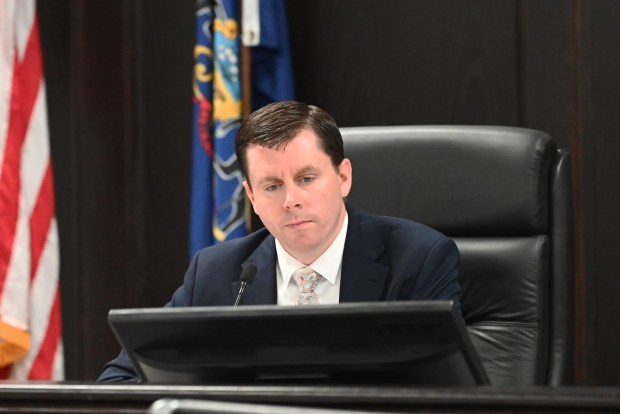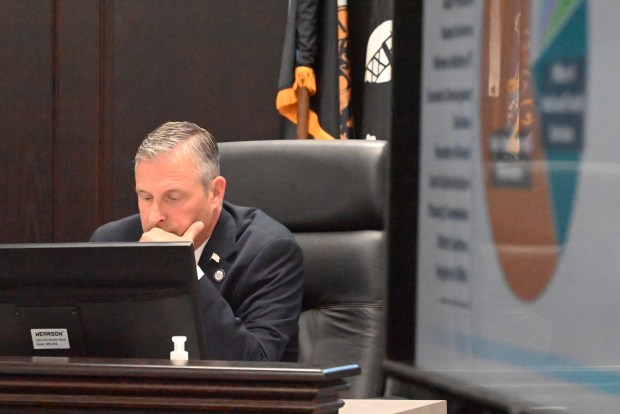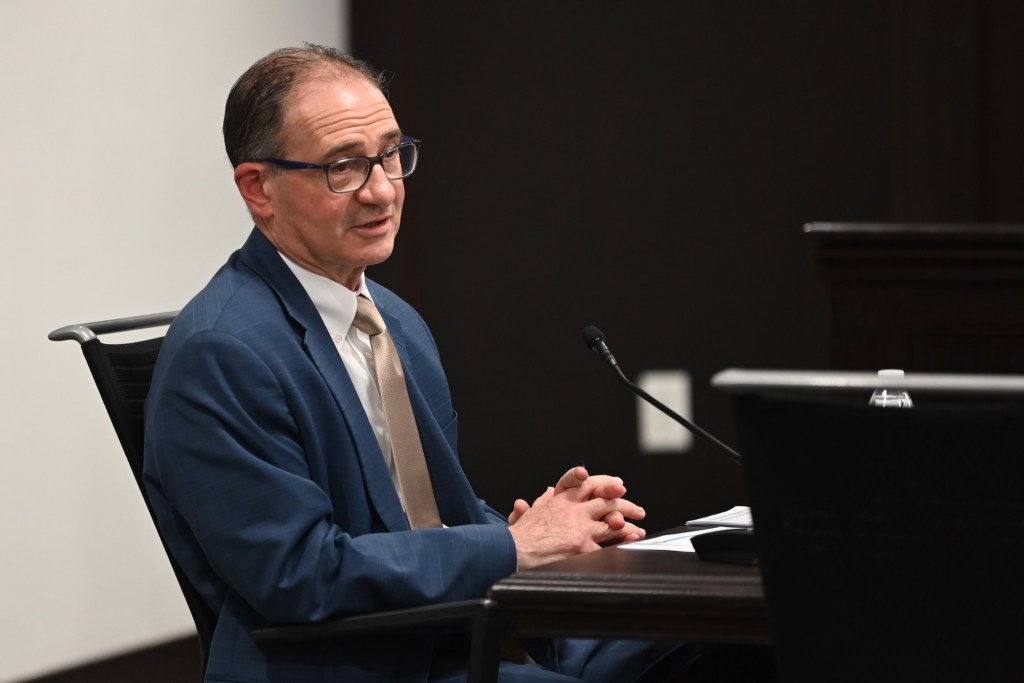SCRANTON — Lackawanna County commissioners released Wednesday a roughly $181 million preliminary 2026 budget that holds property taxes steady next year.
The draft spending plan should come as some relief to county taxpayers hit this year with a nearly 33% tax hike begrudgingly approved in late 2024 to address a financial crisis and mitigate a structural deficit problem exacerbated in recent years by escalating expenditures and relatively stagnant revenues. The precipitous 2025 tax hike and other remedial action taken in pursuit of sustained fiscal stability helped eliminate what was otherwise projected to be a roughly $27.2 million deficit this year.
 Commissioner Bill Gaughan looks at the budget presentation during the meeting unveiling the tentative Lackawanna County 2026 budget at the Lackawanna County Government Center in Scranton on Wednesday, Oct. 15, 2025. (REBECCA PARTICKA/STAFF PHOTOGRAPHER)
Commissioner Bill Gaughan looks at the budget presentation during the meeting unveiling the tentative Lackawanna County 2026 budget at the Lackawanna County Government Center in Scranton on Wednesday, Oct. 15, 2025. (REBECCA PARTICKA/STAFF PHOTOGRAPHER)
It also helped significantly curtail a projected 2026 deficit that county officials were able to close without another tax increase and without drawing down the county’s accumulated fund balance currently estimated to be about $18.7 million
Officials instead erased an initial $4 million projected deficit next year through nearly $900,000 in departmental budget adjustments and the addition of about $3.1 million in expected revenue stemming from the sale of delinquent tax liens and a group health insurance refund, county Chief Financial Officer David Bulzoni said.
The county anticipates $2 million in revenue from the 2026 tax lien sale, something it also did in 2023. The plan entails selling liens for delinquent taxes three years overdue and older, hastening the receipt of revenues through the transaction Bulzoni described as “exclusively a cash flow instrument.”
 Commissioner Chris Chermak looks at the budget presentation during the meeting unveiling the tentative Lackawanna County 2026 budget at the Lackawanna County Government Center in Scranton on Wednesday, Oct. 15, 2025. (REBECCA PARTICKA/STAFF PHOTOGRAPHER)
Commissioner Chris Chermak looks at the budget presentation during the meeting unveiling the tentative Lackawanna County 2026 budget at the Lackawanna County Government Center in Scranton on Wednesday, Oct. 15, 2025. (REBECCA PARTICKA/STAFF PHOTOGRAPHER)
Officials would sell the liens to the county Redevelopment Authority, which would issue a revenue note funded by Fidelity Bank to purchase the liens. The county would then repay Fidelity directly as its Tax Claim Bureau recoups the delinquencies, Bulzoni said.
The anticipated health insurance refund of about $1.1 million in 2026 would be realized if the county’s actual health insurance claims for 2025 total less than what the county pays into a claim fund pursuant to its participation in the Pennsylvania Counties Health Insurance Purchasing Cooperative. Counties participating in the cooperative, about 23 in total, only pay for what they ultimately use and receive a refund if their actual claims are less than projected.
The county would receive the potential refund in two installments, one in May and another in October of next year, Bulzoni said.
Officials also budgeted for a $9.4 million pension contribution in 2026, a $1.5 million increase over 2025.
As currently proposed, the preliminary 2026 budget carries a modest general fund surplus of $7,092.
Democratic Commissioner Bill Gaughan and Republican Commissioner Chris Chermak participated in Wednesday’s budget unveiling, which lacked the acrimony that defined last year’s budget process. Much of that acrimony stemmed from the then-proposed 33% tax hike this year that Gaughan and former Democratic Commissioner Matt McGloin approved over Chermak’s objections.
Unpopular as it was politically and otherwise, the large 2025 hike bolstered the county’s financial position considerably and put it on much stronger fiscal footing entering 2026.
Check back for updates.
Originally Published: October 15, 2025 at 3:03 PM EDT

